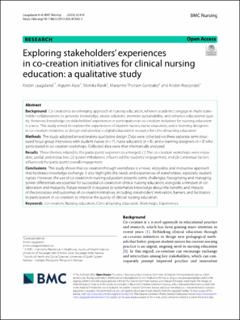Exploring stakeholders’ experiences in co-creation initiatives for clinical nursing education: a qualitative study
Laugaland, Kristin Alstveit; Aase, Ingunn; Ravik, Monika; Gonzalez, Marianne Thorsen; Akerjordet, Kristin
Peer reviewed, Journal article
Published version
Permanent lenke
https://hdl.handle.net/11250/3103273Utgivelsesdato
2023Metadata
Vis full innførselSamlinger
Originalversjon
Laugaland, K., Aase, I., Ravik, M., Gonzalez, M. T. & Akerjordet, K. (2023). Exploring stakeholders’ experiences in co-creation initiatives for clinical nursing education: a qualitative study. BMC Nursing, 22, Artikkel 416. https://doi.org/10.1186/s12912-023-01582-5Sammendrag
Background: Co-creation is an emerging approach in nursing education, wherein academics engage in multi-stakeholder collaborations to generate knowledge, ideate solutions, promote sustainability, and enhance educational quality. However, knowledge on stakeholders’ experiences in participation in co-creation initiatives for nursing education is scarce. This study aimed to explore the experiences of student nurses, nurse educators, and e-learning designers in co-creation initiatives to design and develop a digital educational resource for clinical nursing education.
Methods: The study adopted an exploratory qualitative design. Data were collected via three separate semi-structured focus group interviews with student nurses (n = 7), nurse educators (n = 8), and e-learning designers (n = 3) who participated in co-creation workshops. Collected data were then thematically analyzed.
Results: Three themes related to the participants’ experiences emerged: (1) The co-creation workshops were enjoyable, useful, and instructive; (2) power imbalances influenced the students’ engagement; and (3) contextual factors influenced the participants’ overall engagement.
Conclusions: This study shows that co-creation through workshops is a novel, enjoyable, and instructive approach that facilitates knowledge exchange. It also highlights the needs and experiences of stakeholders, especially student nurses. However, the use of co-creation in nursing education presents some challenges. Recognizing and managing power differentials are essential for successful co-creation in clinical nursing education, alongside a mindset of collaboration and mutuality. Future research is required to systematize knowledge about the benefits and impacts of the processes and outcomes of co-creation initiatives, including stakeholders’ motivation, barriers, and facilitators to participation in co-creation, to improve the quality of clinical nursing education.

